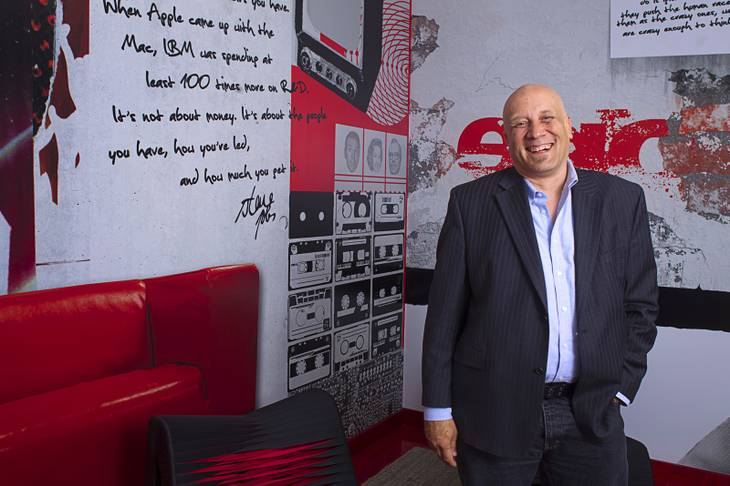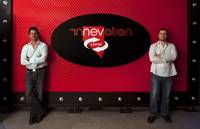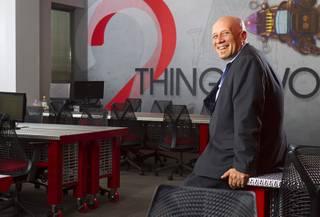A year ago, Las Vegas’ tech sector was creating a lot of buzz but not many results.
Ideas were flying all over the place. Techies would concoct a business plan and work nonstop for a weekend building a website or software, then lose interest and let the concept fizzle. There was only one big pot of tech-focused investment cash, and out-of-state startups typically moved here only if they received money from it.
Today, Las Vegas’ geek scene is maturing, moving past its raw beginnings and gaining footing as a real industry.
Even though local money remains scarce, tech products and companies are becoming better developed than they were a year ago. Low-cost, startup-focused office space has opened and drawn hundreds of tenants, and companies are moving to Las Vegas whether or not they get money from the Zappos-linked investment fund, helping to boost the valley’s fragile economy.
“It has matured,” said Brady Dehn, vice president of strategy at Originate, a software firm. “A year or two ago, there was tremendous energy but very little focus.”
The industry still has a long way to go. With the exception of casino suppliers, the valley’s tech sector still is small and young. Luring talented workers and investment capital remains difficult for local entrepreneurs.
Overall, however, things are on the upswing, with more than 30 tech firms having moved to the valley over the past year, according to Adam Kramer, director of entrepreneurship and Vegas Young Professionals at the Las Vegas Metro Chamber of Commerce.
“We’ve gone from a city with a bunch of energy and some startups to now, (when) we have quite a few startups with funding, and they’re growing,” Kramer said.
Las Vegas’ tech scene has garnered national attention in recent years, largely because of Zappos CEO Tony Hsieh’s efforts to revive downtown. As part of the $350 million Downtown Project, Hsieh and his partners set aside $50 million to invest in tech startups. Since launching the VegasTechFund more than a year ago, they’ve spent almost $20 million funding roughly 60 companies, partner Zach Ware said.
The group started out financing companies that consisted of a few buddies banging around ideas. Now, Hsieh’s team is putting cash into larger businesses with better developed products.
“They’re further along,” Ware said.
Moving-services company Moveline, for instance, which uses a Priceline-model to help customers find the best deal on moving companies, has 18 employees and relocated from New York. Hsieh’s group also is investing in OrderWithMe, a supply chain services group that moved from China and will have more than 20 employees by next year, Ware said.
In addition, more than a dozen companies have relocated to the valley over the past year without any funding from the Downtown Project.
One is software firm Orion Network Solutions. Owner and CEO Tim McCalmant said he was drawn to the valley because of its growing tech scene, low taxes, business opportunities and amenities. He moved from Washington state in September 2012, has five local employees and set up shop in the inNEVation Center, a co-working space near Decatur Boulevard and the 215 Beltway.
Even in the short time he has been here, McCalmant said he has seen a change in how tech startups approach projects.
“They seem to have more of a solidified idea of what they’re doing,” he said.
• • •
Despite the progress, Las Vegas remains far from being a leading tech hub.
In 2011, only 13 percent of the valley’s workforce had jobs requiring science, technology, engineering or math skills, according to a report from the Brookings Metropolitan Policy Program. Las Vegas ranked 99th out of 100 metropolitan areas for STEM jobs.
“I would have been more shocked if we were No. 2,” RCG Economics principal John Restrepo said.
And venture capitalists, who finance startups, have pumped just $16 million into Nevada companies since last year, according to PricewaterhouseCoopers and the National Venture Capital Association. That might seem like a lot, but it’s a fraction of the $48 billion investors spent nationally during the same period.
• • •
Many Las Vegas startups have taken residence in co-working facilities that have popped up in the valley to cater to entrepreneurs who can’t afford traditional office suites.
The inNEVation Center, designed by Rob Roy, CEO of data-center operator Switch, offers big rooms with communal tables, power outlets and Wi-Fi, as well as private offices. It opened in June 2012 and has more than 100 tenants, including the Governor’s Office of Economic Development and other business development agencies.
Work In Progress, developed by the Downtown Project, occupies a two-story, 8,000-square-foot building downtown on 6th Street at Bridger Avenue. It opened in February and has 220 tenants.
Hsieh’s group expects to open another Work In Progress this week on the fourth floor of an office building at 7th Street and Bridger Avenue. The 7,000-square-foot facility will be designed for companies of up to 12 people each, much larger than the other Work In Progress, which was set up for groups of just two or three.
Meanwhile, CoBiz Coworking opened in May 2012 on Tenaya Way at Sunset Road in the southwest valley. The 3,400-square-foot facility has 16 regular users, most of whom work in the tech industry, owner Kat Jaramillo said.
Startup entrepreneurs say they are drawn to Las Vegas because they can be big fish in a small pond and help shape the industry. Had they settled in the Bay Area or another established tech hub, they’d face far more competition for talent, financing and attention.
Las Vegas “is such a budding scene, it’s easy for them to get involved and get noticed,” said George Moncrief, co-founder and chief technologist of Raster Media, a local contract software developer.
• • •
Amid the advancements, the tech sector took some hits this year.
In January, 47-year-old Jody Sherman, CEO of Ecomom, killed himself. Sherman had moved the online retailer downtown from Southern California in January 2012 and was an early endorser of the neighborhood’s rebirth. By October, the company had raised millions in funding and was said to have grown from 15 employees to 34.
Eventually, though, Ecomom reportedly ran out of money. On Jan. 28, Sherman committed suicide.
His company laid off 17 people a few days later and eventually shut down.
Etailz Inc., an online retailer based in Spokane, Wash., acquired Ecomom’s assets this year. The site is up and running again.
In another setback, one of Las Vegas’ most promising startups left for greener pastures.
Romotive, which makes smartphone-controlled robots, came to Las Vegas in 2011 as a three-person startup and set up shop in the Ogden, a downtown high-rise, with a reported $500,000 in funding from Hsieh’s group. Romotive quickly raised at least $5 million in capital, grew to 20 employees and was filling orders for thousands of robots.
In March, however, CEO Keller Rinaudo announced the company was moving to the Bay Area. He cited the need to hire “brilliant talent” and said he wanted to be where the company would be most likely to achieve its goal of building affordable personal robots.
Local executives say they understand Rinaudo’s decision and don’t hold it against him. But the company’s move underscores Las Vegas’ shortcomings.
“We don’t want to lose companies because they have a resources problem,” Chamber of Commerce spokeswoman Cara Clarke said.
• • •
For the sector to really take off, Las Vegas needs more small and medium-sized tech companies that could attract programmers and engineers to the valley, talented people who can help grow companies and maybe start businesses of their own one day.
Local talent these days tend to leave town and flock to larger companies that offer high salaries and good benefits.
Software developers nationally earned a median salary of $90,530 in 2010, according to the Bureau of Labor Statistics. Employment in the sector is expected to grow 30 percent by 2020.
Many startups, however, are so low on cash they pay people with ownership stakes in the company, which are worthless unless the company grows, gets bought or goes public. And the odds of that happening are slim, given startups’ high failure rate. A Stanford University graduate would be hard-pressed to pass up a six-figure position at Apple to work for free at an untested Las Vegas startup.
Persuading people to leave tech-rich California also can be tough.
“Just to tell them, ‘You’re getting a tax break,’ it’s usually not enough,” said Russ Logan, vice president of operations at Originate, a San Francisco company with a dozen employees at the inNEVation Center.
And Las Vegas remains short on a key ingredient: investor capital.
The largest local source of tech-focused investment cash is the $50 million VegasTechFund. Relatively speaking, it’s a small pot of money.
In California alone, venture capitalists spent $4.3 billion in three recent months funding startups. Nevada received $8 million during the same period.
Commercial banks also tend to shy away from lending to tech startups, which can have a high chance of default.
Entrepreneurs often look beyond their home cities for funding, but if there were more local investors in Las Vegas, the valley’s tech scene could grow that much faster.
“The money is not yet here,” said Ben Jones, vice president and co-owner of Jennifer Web Design.
Jones’ wife, Jennifer Markewich-Jones, founded Jennifer Web Design 13 years ago. The couple now have 13 workers and expect to hire another three or four in the next year.
Despite steady growth, getting financing to grow the company has been difficult, Jones said. He tried to get a credit line from a bank to hire more people to take on more projects but was denied. These days, he hires people only when he has enough cash to pay them.
Overall, the valley’s startup scene remains in its early adolescence. But if things continue to progress as they have been, in three or four years, techies could have a good shot at success.
“The risk is going to be relatively low for a company to build itself in Vegas,” Ware said.


